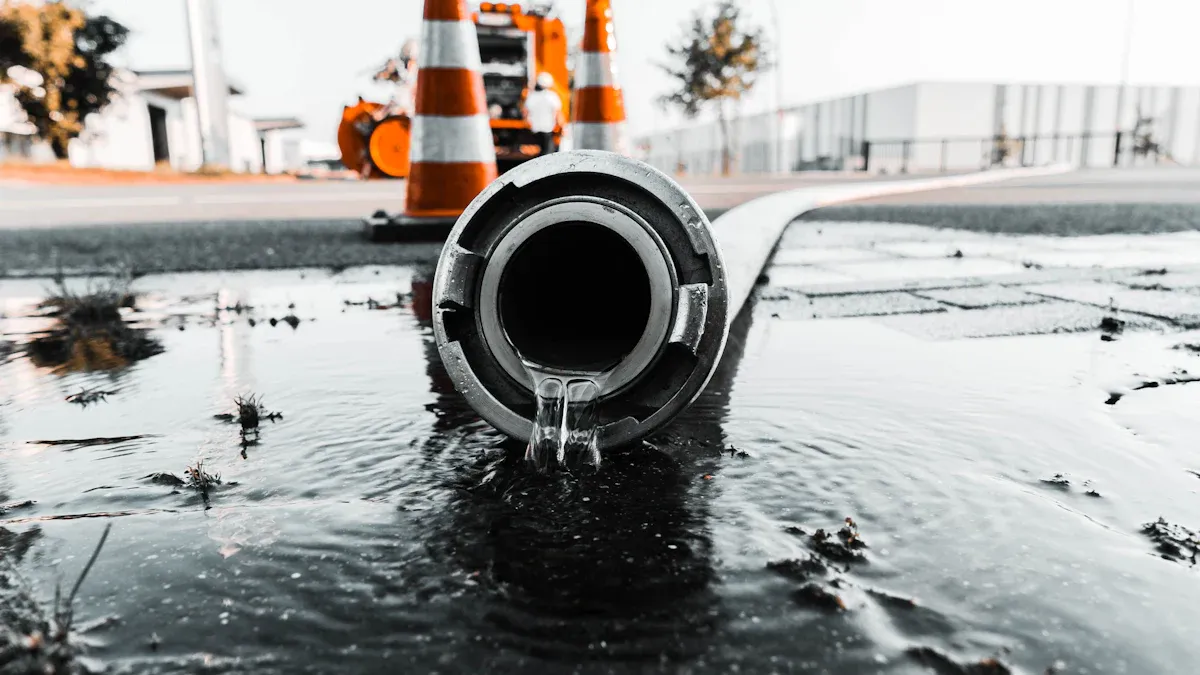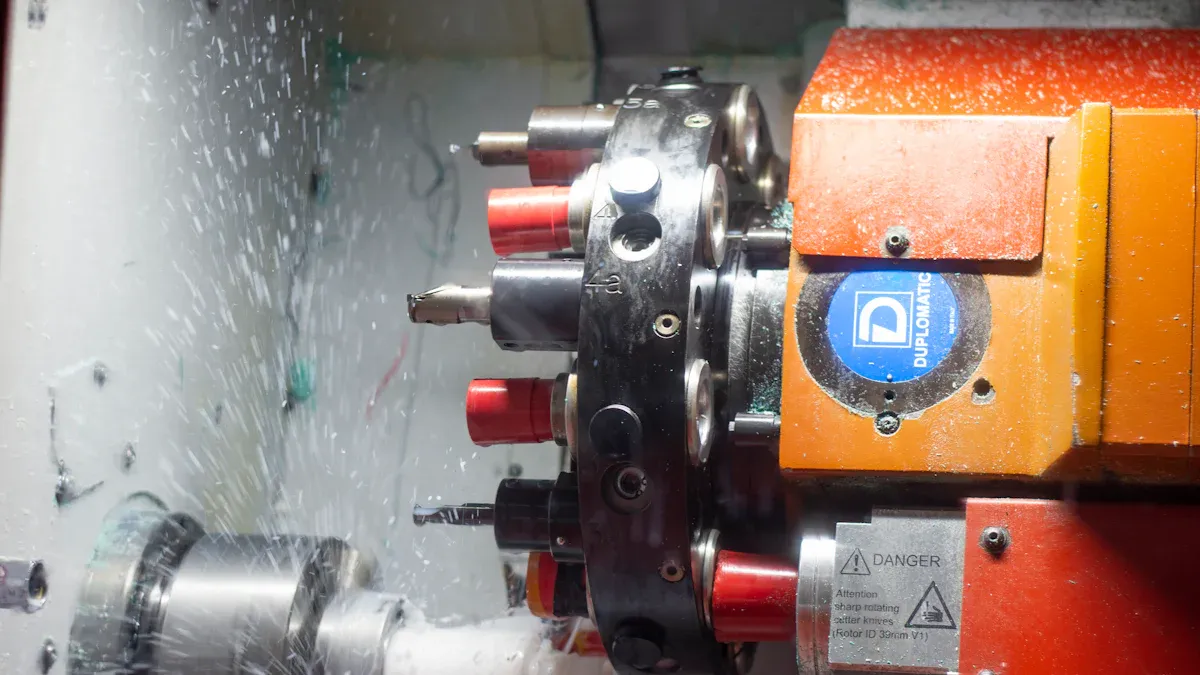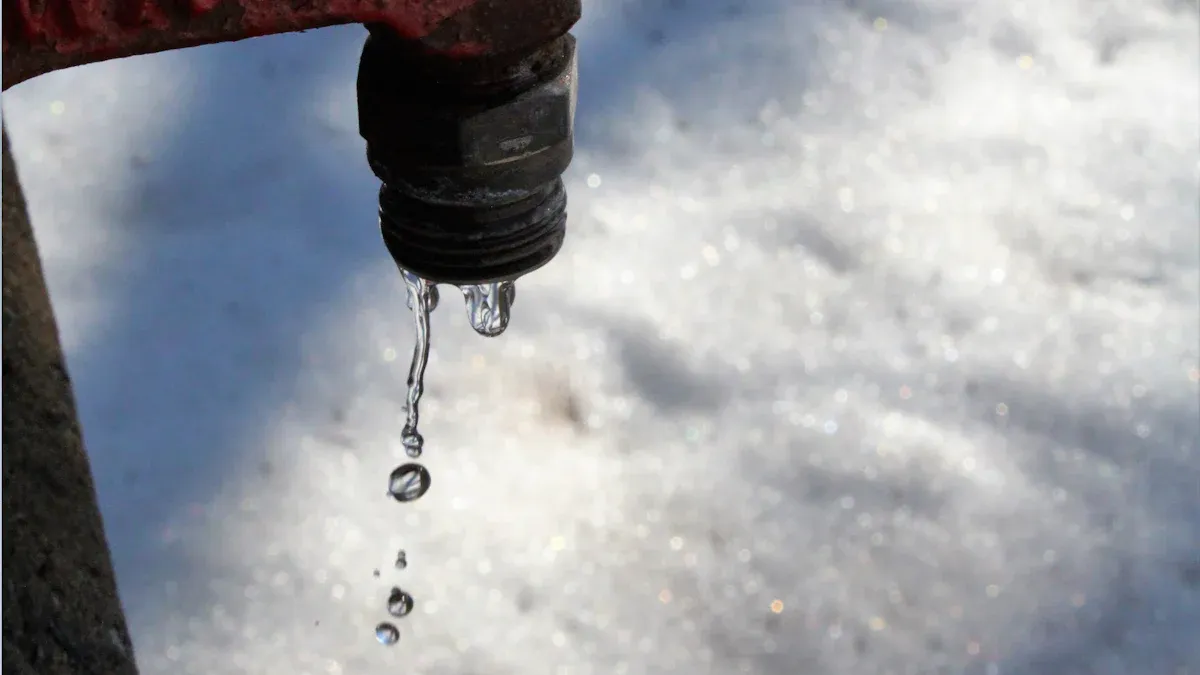
Rubber molded gaskets create a reliable seal that stops leaks between surfaces. You’ll find them essential in industries like automotive and aerospace, where they ensure safe and efficient equipment operation. Their ability to withstand extreme conditions makes them ideal for modern engines. For example, since the 1960s, these gaskets have been used in oil pan seals, valve cover gaskets, and intake manifold gaskets. A custom rubber manufacturer designs them to meet the unique needs of industrial systems, ensuring durability and precise performance.
Rubber molded gaskets are essential components designed to create a tight seal between two surfaces. These gaskets prevent leaks by filling gaps and compensating for surface irregularities. Manufacturers produce them using different methods, such as die-cutting, molding, and extrusion.
Rubber molded gaskets are made from various materials, each suited for specific applications:
These materials ensure that rubber molded gaskets perform reliably in demanding environments.
Custom molded rubber parts play a critical role in improving sealing performance across industries. By tailoring the material properties, such as hardness and elasticity, manufacturers can meet the unique demands of industrial systems. For example, custom rubber compounds enhance resistance to wear and tear, ensuring durability even in extreme temperatures.
These parts also adapt to diverse environments, pressures, and chemical exposures. Whether you need gaskets for high-pressure pipelines or equipment exposed to harsh chemicals, custom solutions provide the flexibility to address these challenges. Industrial rubber products, like custom molded gaskets, ensure reliable sealing and long-lasting performance, making them indispensable in industrial applications.

Rubber molded gaskets rely on compression and flexibility to create an effective seal. When you install a gasket, it compresses between two surfaces, filling any gaps and preventing leaks. This compression ensures that the gasket maintains constant contact with the surfaces, even under pressure or vibration. Vulcanized rubber enhances this process by increasing the gasket's strength and elasticity. This makes it durable enough to handle wear and tear while remaining flexible for complex sealing applications.
Proper compression is essential for a reliable seal. For instance:
- A 2mm thick O-ring compressed by only 30% may fail to seal effectively if the parts warp.
- Designing seals with extra deflection allows them to handle distortion or over-pressurization, ensuring the seal remains intact.
Engineers carefully calculate the deflection of rubber molded gaskets to ensure they can accommodate potential distortions. This proactive approach helps maintain the integrity of the seal, even in extreme conditions.
Rubber molded gaskets excel at adapting to surface irregularities. The flexible elastomers used in their design allow them to conform to uneven surfaces, ensuring a tight seal. This adaptability is especially important in industrial systems where surfaces may not be perfectly smooth. By filling in these irregularities, the gasket minimizes the risk of leaks and mechanical failures.
You’ll find that this adaptability also enhances the gasket's performance across different pressure environments. Whether the system operates under high or low pressure, the gasket provides uniform sealing. This consistency ensures that your equipment runs efficiently and safely, even in challenging conditions.
The material properties of rubber molded gaskets play a critical role in preventing leaks. Manufacturers test these gaskets to ensure they meet specific performance standards. For example:
| Test Type | Description |
|---|---|
| Leak Testing | Identifies leaks or weak points through pressure testing. |
| Property Testing | Assesses tensile strength and resistance to chemicals. |
These tests validate the gasket's ability to withstand pressure, temperature changes, and chemical exposure. Materials like EPDM and silicone rubber are particularly effective due to their resistance to weather, UV rays, and high temperatures. This makes them ideal for outdoor and high-temperature applications.
By selecting the right material and ensuring it meets rigorous testing standards, you can trust that rubber molded gaskets will provide reliable leak prevention in your industrial systems.
When choosing materials for custom EPDM gaskets, you need to consider several critical factors to ensure optimal performance. EPDM (Ethylene Propylene Diene Monomer) stands out as a versatile material for demanding industrial environments. Its ability to resist extreme temperatures, UV rays, and ozone makes it ideal for outdoor and high-temperature applications. For instance, EPDM gaskets can handle temperatures ranging from -60°F (-51°C) to 300°F (150°C), making them suitable for both freezing and scorching conditions.
EPDM also performs exceptionally well in water-based applications. It resists swelling and degradation when exposed to water, making it a reliable choice for sealing pipes, tanks, and steam systems. However, it’s important to note that EPDM is not recommended for use with aromatic hydrocarbons or certain solvents, as these can compromise its integrity.
Material selection for custom gaskets involves evaluating specific criteria to match the gasket to its intended application. The table below highlights key considerations:
| Criteria | Considerations |
|---|---|
| Physical and Mechanical | Strength, mechanical stress, compatibility with mated components. |
| Thermal Properties | Performance in extreme temperatures, stability during heating and cooling cycles. |
| Flammability | Resistance to burning or scorching in high-temperature environments. |
| Chemical Resistance | Durability against industrial chemicals, oils, and solvents. |
| Electrical Properties | Requirement for conductive or insulative materials. |
By carefully evaluating these factors, you can ensure that your custom EPDM gaskets meet the specific demands of your industrial systems.
The design of custom EPDM gaskets plays a crucial role in achieving effective sealing. You need to focus on parameters like surface roughness, geometric configurations, and material stability. For example, studies on mechanical seals emphasize the importance of low surface roughness to enhance hydrodynamic lubrication. This reduces friction and improves the gasket’s sealing performance.
Geometric configurations also impact the gasket’s ability to prevent leaks. Designs that account for potential distortions, such as wavy or labyrinth patterns, help maintain a tight seal even under pressure. These configurations minimize leakage by addressing factors like porosity and surface irregularities.
When designing custom gaskets, you should also consider the operating environment. For instance, EPDM gaskets used in steam systems must maintain their properties under high temperatures and pressure. By addressing these design parameters, you can optimize the gasket’s performance and ensure long-lasting reliability.
Custom EPDM gaskets are built to withstand harsh industrial conditions. Their resistance to wear, high temperatures, and chemical exposure ensures long-term durability. For example, EPDM gaskets excel in environments with frequent temperature fluctuations, maintaining their integrity without cracking or degrading.
These gaskets also resist environmental factors like ozone and UV rays, making them ideal for outdoor applications. In addition, EPDM’s ability to handle steam and water exposure without swelling or breaking down ensures reliable performance in wet environments. This makes them a preferred choice for sealing steam pipes, boilers, and water tanks.
Durability testing further enhances the reliability of custom gaskets. Fatigue tests help predict the lifespan of gaskets by identifying weak points caused by repetitive loads or torsional twisting. Environmental tests assess the gasket’s performance under extreme conditions, such as high temperatures or chemical exposure. By selecting EPDM gaskets, you minimize the need for frequent replacements, ensuring consistent performance and cost savings over time.

Rubber molded gaskets play a vital role in ensuring the efficiency and safety of pumps, valves, and pipelines. These components are widely used in industries such as automotive, aerospace, and the oil and gas industry. Their primary function is to fill gaps between mating surfaces, preventing leaks of fluids and gases. This is especially critical in systems where even minor leaks can lead to significant operational failures.
The compressibility of rubber molded gaskets allows them to adapt to uneven surfaces, creating a secure seal. For example, in the oil and gas industry, pipelines often operate under high pressure and extreme temperatures. Rubber gaskets ensure that these systems maintain their integrity, reducing the risk of leaks and costly downtime. By providing a reliable seal, these industrial rubber products enhance the performance and longevity of critical equipment.
Rubber molded gaskets effectively address several challenges faced by industrial equipment. Their ability to provide precise sealing solutions ensures that systems operate efficiently and safely. The table below highlights some common challenges and how these gaskets solve them:
| Challenge Addressed | Solution Provided by Rubber Molded Gaskets |
|---|---|
| Production Efficiency | Rapid design and prototyping through 3D printing reduce time and costs. |
| Dimensional Precision | Ensures a perfect fit and function in industrial applications. |
| Chemical Compatibility | Engineered materials withstand various environmental conditions. |
| Mechanical Properties | Excellent tear-resistance and elongation enhance durability. |
In addition to these benefits, rubber molded gaskets excel in preventing leaks in water systems. Substandard gaskets often lead to critical failures, resulting in expensive repairs and operational downtime. You can rely on these industrial rubber products to manage pressure effectively and withstand wear, ensuring consistent performance. Their durability and adaptability make them indispensable in the oil and gas industry, where equipment faces harsh conditions daily.
By addressing these challenges, rubber molded gaskets contribute to the overall reliability and efficiency of industrial systems. Their role in maintaining operational success cannot be overstated.
Rubber molded gaskets play a vital role in preventing leaks and improving the efficiency of industrial systems. Their ability to adapt to specific needs through customization ensures they meet the demands of various applications.
With durable materials and precise designs, these gaskets provide reliable performance even in harsh environments.
You can depend on them to address challenges like chemical exposure, extreme temperatures, and pressure variations. By ensuring safety and performance, they remain an indispensable part of industrial operations.
Rubber molded gaskets offer flexibility, durability, and resistance to extreme conditions. They adapt to surface irregularities and maintain a tight seal under pressure. Unlike rigid materials, rubber gaskets handle vibrations and temperature changes effectively, making them ideal for industrial applications.
You should consider the operating environment. For example, EPDM works well in outdoor and water-based systems, while Nitrile resists oils and fuels. Evaluate factors like temperature range, chemical exposure, and mechanical stress to select the best material for your needs.
Yes, rubber molded gaskets perform well in high-pressure systems. Their compressibility and elasticity allow them to create a secure seal, even under intense pressure. Proper material selection, such as Fluoroelastomer (FKM), ensures they withstand demanding conditions without failing.
Custom rubber gaskets provide tailored solutions for specific challenges. They improve sealing performance, reduce maintenance costs, and extend equipment life. By addressing unique requirements, such as chemical resistance or precise dimensions, custom gaskets ensure reliable and efficient operation.
Inspect gaskets regularly for wear, cracks, or deformation. Clean them with compatible solutions to remove debris or residue. Replace damaged gaskets promptly to prevent leaks. Proper maintenance ensures long-lasting performance and reduces the risk of equipment failure.